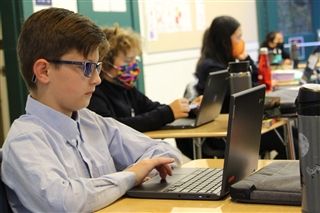GNS Students got out and voted on October 23, as a way to rehearse their civic duty. Students at the Junior, Middle and Senior Schools all took part in separate Student Votes for who they would choose as their representative in the BC Legislature for Oak Bay-Gordon Head. Here are the results of the Student Vote across the school:
| Junior School | Middle School | Senior School | |
| Florian Castle, Communist Party of BC | 0.56% | 9.62% | 9.56% |
| Nicole Duncan, BC Green Party | 48.59% | 33.97% | 23.53% |
| Roxanne Helme, BC Liberal Party | 29.38% | 25.00% | 28.68% |
| Murray Rankin, BC NDP | 21.47% | 31.41% | 38.24% |
Junior School Students had their first taste of a Student Vote at the Beach Drive campus when they voted for who they would like to see elected as a representative in the BC Legislature. The Junior School voted for Nicole Duncan of the BC Green Party with 48.59% of the vote. “It’s important that everyone has a say,” said Linnea Wolf ’28 about why it’s important to vote. “It’s important to get youth into it because you can vote when you’re 18 and it’s important to start early.” “If you don’t have a say, then other people are running your life,” said Nathan Brooke ’28. Before the Student Vote, four Grade 12 students visited the Grade 5 classes to speak with them about voting and the responsibility it holds. “It was very interesting,” added Nathan.
Middle School Students voted a little differently this year, as they voted online to be environmentally responsible. Each homeroom has two Student Activity Council representatives, and these students were able to ‘run’ the voting on October 23. The Middle School had a unique link, and each student was given a personal code from their class representatives as a way to log-in and vote. “It’s important to practice and get used to voting; it’s an important right,” explained Evan Papps ’25. “Going to vote is very serious, and it’s important to be well researched because, without voting rights, all the other rights don’t exist.” The week leading up to the student vote, Middle School Activity Council representatives encouraged conversations about the election in their respective homerooms and about why it was important to participate, and they suggested students explore Vote Compass. Getting to understand politics and the differences between parties was an important endeavour to many students in the Middle School. “It’s important for our future to vote,” said Ryan MacPherson ’25. “When we are at the voting age we will be voting for who we want to run, and if we aren’t well versed, then our government won’t accurately represent us.” In the Middle School Student Vote election, Nicole Duncan of the BC Green Party was voted in with 33.97% of the vote. Senior School Students in Grades 9 to 12 also took part in the Student Vote, where they elected BC NDP candidate Murray Rankin with 38.24% of the vote. Voting took place in person in the Gudewill Learning Commons. While this was good practice for students who will be eligible to vote soon, many reflected that not all countries have these opportunities. Recently, two students used China as an example to compare and contrast human rights in their IB Diploma Extended Essays. Hannah Yin ’21 has just completed her essay on Uygur re-education camps in China, where she focused on power and how it affects the upholding of human rights. Talking to Hannah, she said she can see the correlation of her essay with the voting process. “I think voting is important, and basically a right in Western society. Whereas in China they don’t have that, and they don’t have the ability to express their opinions because people can express their opinions in many different ways,” she said. “They can do this by protesting, voting, by media and free speech—none of these can really happen in China because it’s not a democracy…I think if people have the opportunity to vote in a Western state you should grab that chance if you care about the issue.” Anders Woodruff ’21 chose to look into China’s five-year plan from 2006 to 2010 and analyze it to see how it affected inequality in China. “You will get people that say there are elections in China, therefore, it’s a democracy just like the West, but they don’t have freedom of speech, freedom of the press, they don’t have multiple competing parties. So, it really isn’t like Canada. But, on the other hand, you get a lot of Westerners who think China is a military dictatorship like the ones we have seen where the party rules by force of will, which is to some extent true but one thing in my extended essay was I was surprised the types of ways civilian bodies can affect the government even if it’s not directly through voting.”





